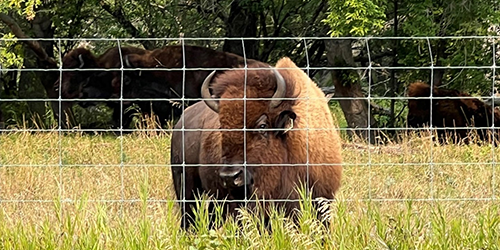
Manitoba Liquor & Lotteries (MBLL) recently partnered with Manitoba Habitat Conservancy (MHC) on a unique project to offset carbon emissions associated with the animal protein we serve in our casino restaurants.
According to the World Resources Institute, animal agriculture (i.e. meat and dairy) is responsible for between 11% and 20% of global greenhouse gas emissions and over 30% of global methane emissions. This production has an impact on water, biodiversity, animal well-being, and more.
“We’ve long measured emissions across our operations,” said Donna Dagg, manager of sustainability with MBLL. We measure the direct emissions emitted from the facility or asset we operate, like emissions from our fleet vehicles, or emissions through the energy we require to operate – natural gas, for example.
“And then there are a number of indirect emission sources resulting from essential business activities that we do not directly control but can absolutely influence to help reduce global emissions – like delivery contracts and the production of animal protein we purchase for our casino restaurants.”
With this in mind, MBLL contributed over $72,000 to MHC’s Grassland Stewardship program, which helps livestock producers put in place beneficial management practices for sustainable grassland and pasture grazing management.
While the program provides benefits for wildlife and biodiversity, a supporter’s priority on keeping carbon in the ground is a program-first, said Stephen Carlyle, MHC’s CEO.
“We’re always open to new partnerships. This was a novel one. It’s the first time we’ve done something specifically to offset carbon emissions.
“Most organizations aren’t at MBLL’s level in understanding the different scopes of their emissions. Kudos to them for putting dollars toward this opportunity.”
MHC has been working since 1986 to conserve fish and wildlife habitat in Manitoba. They accomplish this through voluntary agreements with landowners to conserve, restore, and enhance habitat on their property.
Landowners like Jim and Bridie Ritchie.
The Ritchies are bison farmers on an 835-acre site near Souris.
MBLL’s support is helping cover the infrastructure costs of several miles of fencing for the Ritchie bison herd and their neighbour Brian Powell. Perimeter fencing allows for rotational grazing, a beneficial practice for the health of the grasslands.
Carlyle explained that resting native grassland through rotational grazing allows plants to put down healthier root systems. Being native to the prairies, the bison also benefit Manitoba’s grasslands by punching down the turf with their sharp hooves, spreading manure throughout the area which acts as a natural fertilizer for the pasture grasses. This all helps keep carbon in the ground that would otherwise be released into the atmosphere.
For MBLL, the project was a natural fit, said Donna Dagg.
“The chefs and restaurant staff do a great job reducing edible food waste at the casinos and collect food waste for composting to reduce emissions. But meat consumption is not going away anytime soon; customers at our casino restaurants continue to enjoy it, as do consumers everywhere. We asked ourselves, ‘how can we offset it?’.”
“Our leadership team, our customers, and our employees have all voiced their interest in nature-based solutions like this one.”
The grassland project is one among many efforts in the corporation’s overall plan for environmental responsibility. MBLL is committed to achieving “net-zero” emissions by 2050.
Net-Zero 2050 is the response of more than 120 countries including Canada to the worsening impacts of climate change. It’s a commitment to cutting our carbon emissions down to the amount that forests and other ecosystems can absorb and store, leaving zero in the atmosphere.
Back to the near term, the project shows how organizations like MBLL and MHC are good together.
“What I like about this partnership,” said Carlyle, “is we’re both built to serve Manitobans. We’re two local organizations working collaboratively to support the environment in our own backyard.”
